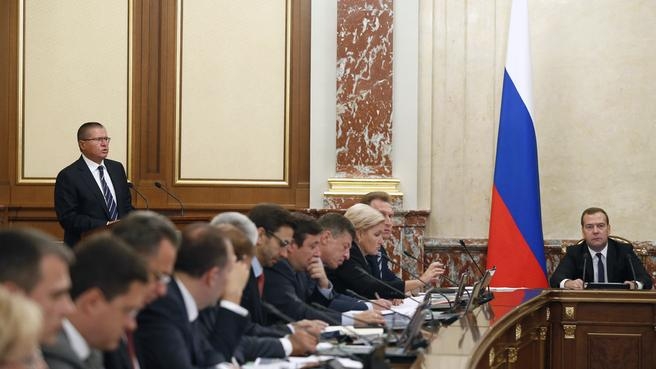Government meeting
Excerpts from Dmitry Medvedev’s opening remarks
Working on the new three-year budget, we proceeded from the adjusted forecast of the country’s socioeconomic development for 2015-2017. On the whole, the macro-economic parameters that we put into the budget’s foundation considerably differ from the ones for the 2014-2016 budget. The forecast takes into account a number of negative factors linked to the change in the foreign economic situation, including a sharp reduction of access to financial resources and restrictions on deliveries of high-tech equipment. The domestic conditions also played a role: a slowdown of economic growth rates, reduction in investment and consumer demand, accelerated inflation and continued capital drain. We have taken into account all these negative factors.
The main problem we are facing today is the high degree of uncertainty as to how long it will take to restore confidence, businesses’ willingness to invest, how the consumer market will grow and what steps our partners will take.
According to the Ministry of Economic Development, the GDP will grow by 0.5 percent this year. We expect it to grow a bit quicker next year: up to 1.2 percent. We have better expectations for 2016: up to 2.3 percent; and three percent in 2017. But this is a basic scenario. There are more pessimistic and more optimistic scenarios as well. Right now we are proceeding from this basic scenario.
Based on these estimates, we obtain the federal budget’s revenues and expenses. Our main task was to balance out its parameters so as to retain macro-economic stability and fulfill all social commitments.
Dmitry Medvedev: "According to the Ministry of Economic Development, the GDP will grow by 0.5 percent this year. We expect it to grow a bit quicker next year: up to 1.2 percent. We have better expectations for 2016: up to 2.3 percent; and three percent in 2017."
I’d like to make several important points.
As before, the main expenditure item is social support for our citizens and provision of socially significant services in education, healthcare and culture. We have allocated 57 percent of the federal and regional budget funds for this purpose. The federal budget alone will spend over 2.5 trillion roubles on pensions, various allowances, subsidies and compensations in the next three years.
By 2017, expenses on education, healthcare and social policy will exceed the 2014 level. We will continue increasing salaries of public sector employees: teachers, medical and social workers and scientific associates. We will continue to support regional budgets that bear the brunt of the financial burden in implementing the President’s May executive orders.
Second, in the next few years, we will preserve our budget rule, which allows us to control increases in budget expenditures and keeps our budget system strong in the face of potential oil price fluctuations. The reserve fund will reach about 3.5 trillion roubles next year, 3.6 trillion in 2016, and 3.7 trillion in 2017.
Third, the expenditure budget is based on the Government’s priorities in implementing state programmes. We had to considerably streamline expenses, even though this is unpleasant and hard to do.
Dmitry Medvedev: "Second, in the next few years, we will preserve our budget rule, which allows us to control increases in budget expenditures and keeps our budget system strong in the face of potential oil price fluctuations. The reserve fund will reach about 3.5 trillion roubles next year, 3.6 trillion in 2016, and 3.7 trillion in 2017."
I’d
like to emphasise that we are trying to maintain the same level of funding for
programmes that are of fundamental importance for the economic growth of the
country, along with support for our citizens. These priorities include the
construction of the transport and energy infrastructure, regional development
and growth of agriculture. By reducing expenses we plan to keep the national
debt at the economically safe level of less than 15 percent of the GDP. I hope
everyone understands how important this is right now.
<…>













